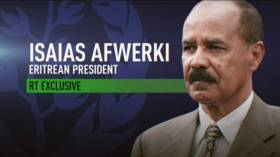US panicking over Africa’s ties with Russia – Eritrean president

Russia would have been able to mobilize support to end the US-led unipolar global order of “interference, demonization, and containment” if it had taken the necessary steps earlier, Eritrean President Isaias Afwerki has claimed.
The leader expressed his strong disapproval of the prevailing “law of the jungle” in an exclusive interview with RT.
“No one is happy with this state of affairs. These are states of unipolarization, using every weapon, tool to intimidate, sabotage and even contain everybody is not acceptable by anyone,” Afwerki said.
Eritrea has consistently opposed resolutions against Russia in four separate votes held at the UN General Assembly and the UN Human Rights Council. That includes rejecting a vote aimed at condemning Russia’s military operation in Ukraine.
When asked why his country did not back the UN resolution to blame Russia for its position on Ukraine, the president said Eritrea would not support the ideology of “hegemony” and repression.
“We are in a situation where one group of hegemonistic forces, NATO led by Washington, has declared war against humanity and humanity has the right to defend itself. And Russia has the right to defend itself. We don’t accept any hegemonistic strategy or declaration that condemns Russia,” Afwerki insisted.
He argued that the conflict in Ukraine is a scheme against Russia, with Washington aiming to weaken and sabotage Moscow’s development in every aspect using sanctions.
Reflecting on Eritrea’s own experiences, Afwerki recalled the nine years of sanctions imposed on his country, claiming that they were unjustified and based on fabricated “lies” from the US that Asmara was supporting terrorist organizations.
According to the leader, despite the economic, infrastructural, and environmental damage inflicted, the sanctions had taught valuable lessons. As a result, Eritrea is now more determined to forge partnerships with countries worldwide to break free from the cycle of sanctions and build a better future.
He said his government is seeking ways to expand bilateral relations with Russia that go “far beyond cooperation in transport” and extend to an integrated approach.
Speaking on the upcoming Russia-Africa summit scheduled for St. Petersburg in July, Afwerki believes that the gathering will be part of the dynamics for charting a path and developing mechanisms towards ending Western dominance.
“We need to work together to create a new environment different from what we see now. Unipolar domination, containment, sabotage, sanctions, we need to get out of this circle,” he noted.












